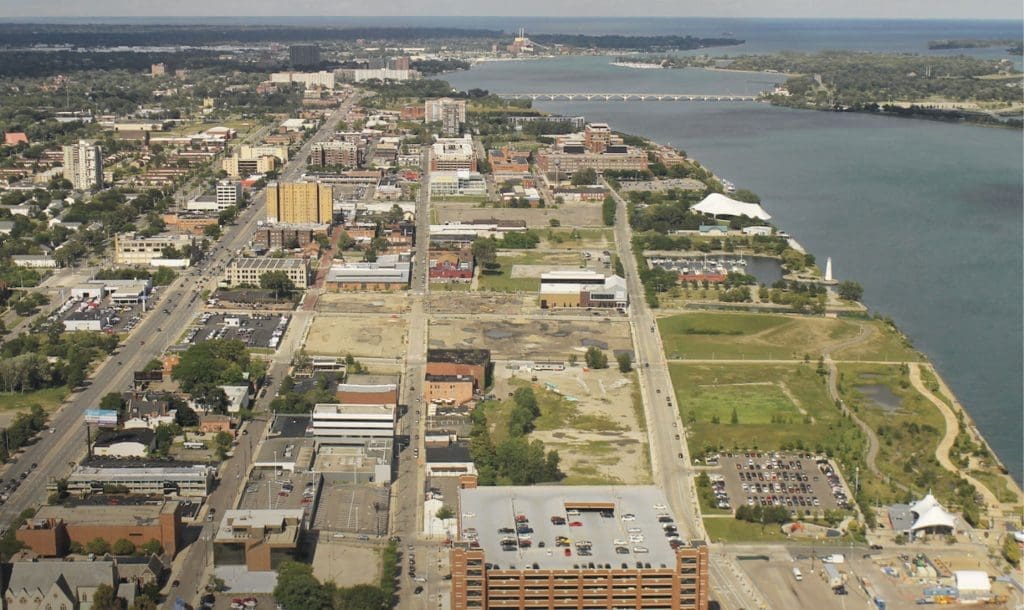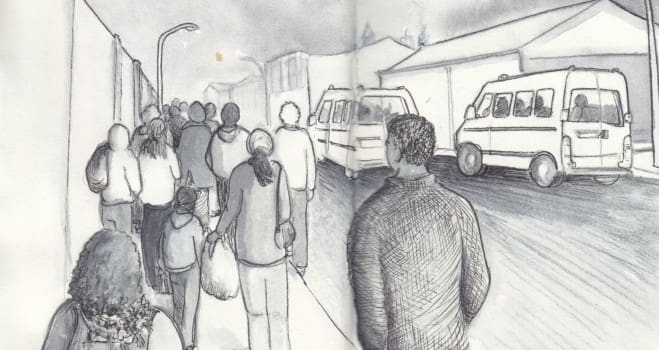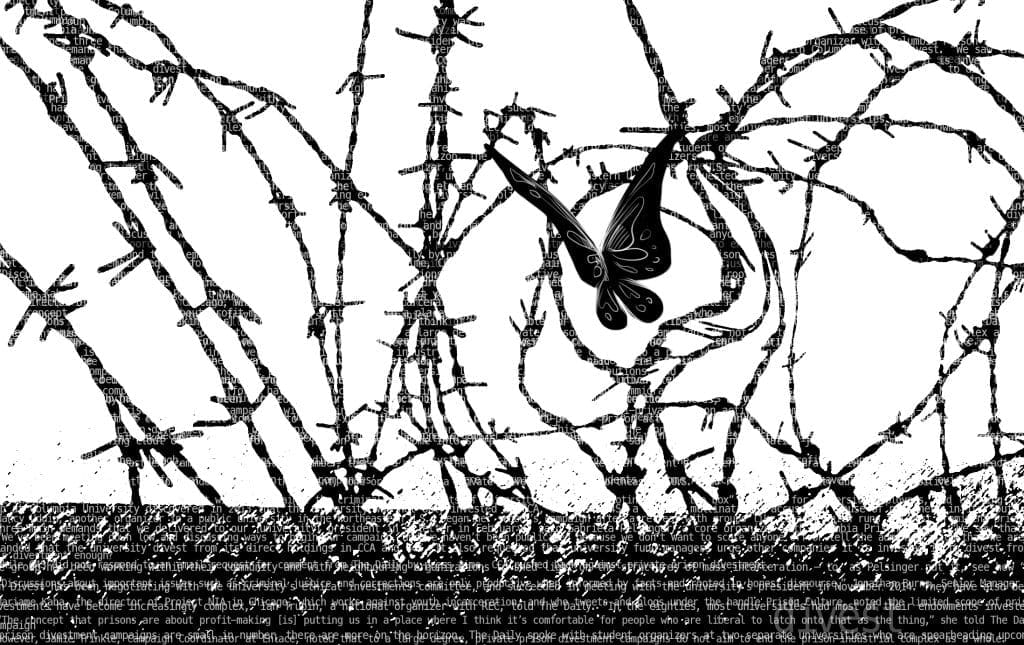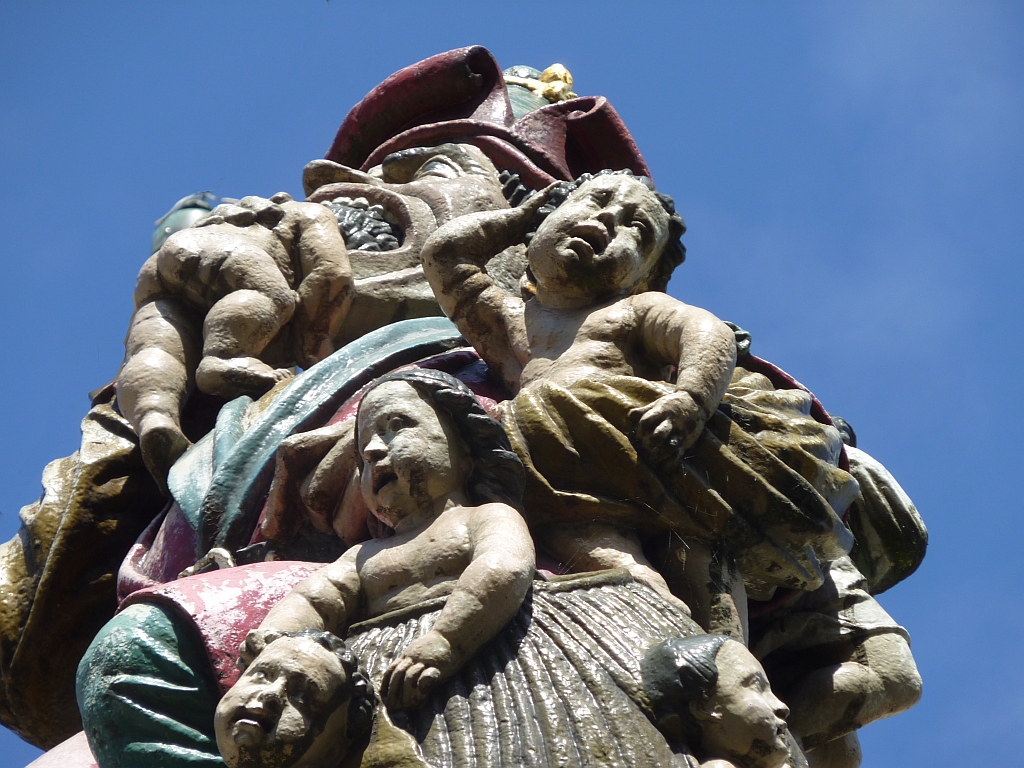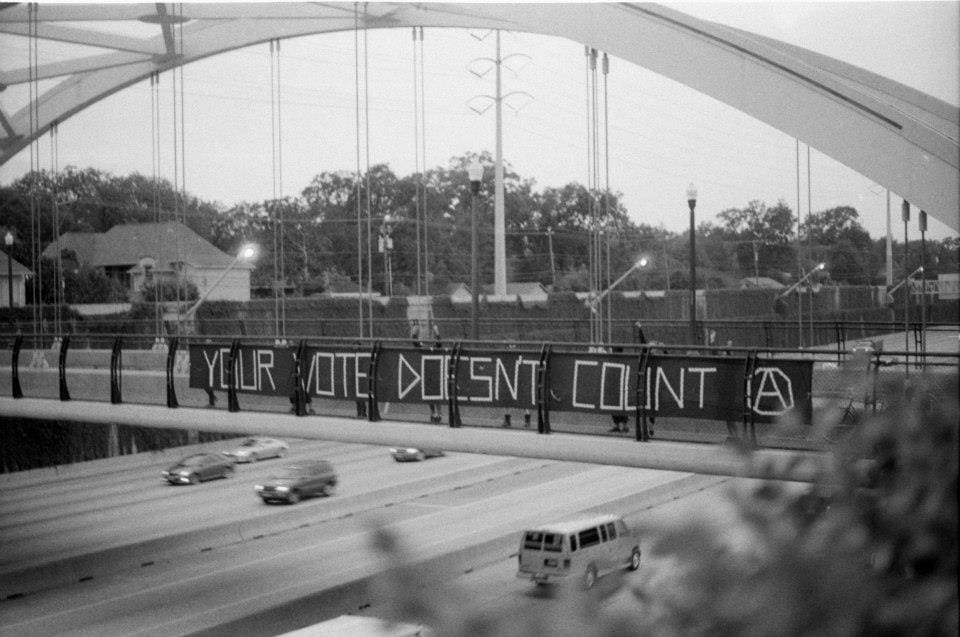Transcribed from the 4 August 2018 episode of This is Hell! Radio (Chicago) and printed with permission. Edited for space and readability. Listen to the whole interview:
There is going to be a fight over who the city is for. Is it the nice bars downtown, or is it the average folks who are living and struggling in the neighborhoods?
Chuck Mertz: There’s a revolution happening in Detroit, and here to drive us through it and to explain there’s nothing like what’s happening in the Motor City, the city where I was born: journalist and screenwriter Drew Philp, author of A $500 House in Detroit: Rebuilding an Abandoned Home and an American City.
Welcome to This is Hell!, Drew.
Drew Philp: Hi, how you doing?
CM: Great! It’s good to have you on the show.
In your article at the Guardian last year about the water shortage that happened last year in Detroit, “No water for poor people: the nine Americans who risked jail to seek justice,” you wrote about then-73-year-old Detroit activist Marian Kramer and an ordained Methodist minister named Bill Wylie-Kellerman, who were arrested for blocking private water shutoff trucks in their home town of Detroit.
“Along with seven others and a host of onlookers, Kramer and Kellerman linked arms, sang songs, and prayed while obstructing the only entrance to Homrich Inc., the private company hired to perform the deed. Only a handful of shutoffs were performed that sweltering summer day, compared to the usual four hundred or so.
“In 2016, more than one in six Detroit households had their water cut off—83,000 homes over the past three years. In defiance of the status quo, the group that would come to be known as the Homrich Nine would use their bodies and lives as the collateral for the sins of a nation.”
Why were so many homes losing access to water in Detroit? This even became an issue at the UN.
DP: Great question, and it’s one that is still up for debate. Activists think that the water is being shut off to gentrify the city, quite simply. Gentrification is not happening in Detroit in the same way that it’s happening in Brooklyn or San Francisco, where rents are rising astronomically and people are being priced out. There is desperate poverty in Detroit, and one way to clear the city of that poverty and open it up for “investment” from very rich men is to expel the elements in the city that are potentially undesirable to capital. The water shutoffs were one way that was happening.
We saw Bill Kellerman and Marian Kramer, along with seven others, put their lives and their freedom on the line to confront this. Their court case lasted more than two years. They refused to plea out, and wanted it to go to court. One day when the jury was in the hallway, walking to deliberate, the government shut the trial down and commenced a new trial, starting all over again. It was a pretty wild situation.
But it’s also an excellent representation of what is happening in Detroit now. There are people with enormous amounts of conscience fighting to make the city what we all believe it can be.
CM: You write, “When reporters come to places like Detroit, their articles often read as simple catalogs of misery, records of the mute suffering of the poor and dispossessed. While it’s true Detroit has no shortage of wretchedness, taken together these stories paint a picture of helpless people who are acted upon, people with no agency.”
While it is important to know the misery that people can experience, what do you think is the best way to report on it without either making the people seem helpless or hopeless, while simultaneously not making the story about—this is the typical narrative that you see in the media—the resilience of residents in overcoming obstacles that may lead outsiders to actually think that their problems can be solved, that the system actually works for residents?
What’s the best way for this stuff to be reported on?
DP: The best way to do that is to hire reporters in the places you would like to report on. It’s difficult for people from New York, for example, wearing expensive suits, to talk to people wearing workboots in misery. And this isn’t just about location, this is for people of color, women writing stories.
I’ve lived in Detroit for ten years; I’ve grown up in Michigan my whole life, in a very rural area, and I have a different perspective on what goes on there. I have much deeper sources, much deeper insight into the community structure, and that changes how things get reported. I can find stories like this that has been going on in Detroit for two years. This was a very long trial that I don’t think anyone else reported on. It’s difficult to find that sort of thing if you just parachute in and go to a bar or two for a weekend.
Part of the problem with telling the story of the water shutoffs in Detroit is that the city doesn’t even have good numbers. The city doesn’t even know how many people have turned back on, or how many people have been turned off and are still living without water. Activists think it’s a lot, and I would tend to agree. A lot of people I talked with had issues. But the records in Detroit are notoriously un-well-kept (we’ll say it that way).
However, the United Nations did come and say that what Detroit was doing was a violation of human rights. It’s also important to remember that Detroit literally sits on the largest source of fresh water on the planet, the system of the Great Lakes—which is absurd to think about. But anyways, the United Nations came and said this is clearly a violation of human rights. That’s something to report on right there, that in America, on the largest source of fresh water, the UN is coming in and saying, “Whoa, what are you guys doing?”
CM: What does that say to you about Detroit, about the state of Michigan—or about the state of capitalism and democracy in Detroit and Michigan—when they’re trucking in water from elsewhere, even internationally, despite the largest source of fresh water being right on Detroit’s doorstep? What does that reveal to you about the shortcomings of the systems that we live within?
DP: It’s the same thing with Flint. One thing that stories about water in Michigan in particular have gotten wrong or missed is that these things happen under emergency management, a plan by the governor who deposed entire city governments, for example of Detroit and Flint, and installed a dictator, literally, who had complete control over the decisions of the city and answered only to the governor. These decisions were made under an emergency manager. That is the scariest part to me.
At one point in Michigan, when Detroit and Flint were under emergency management, one out of every two black people in the state had lost the right to vote for their local elected leaders. One out of every two black people in Michigan lost the right to elect their local leaders. That’s enormous, and has been missed in a lot of these stories.
I read a book called A Small Place by Jamaica Kincaid, and it convinced me to stay home and use my education, and maybe some small talents that I had, for good in the place that I come from. I looked at Detroit as staying home. I didn’t know what I wanted to do, but I knew that I wanted to do it in the place that I grew up and had known my whole life.
I live in the United States, and the Republican governor here thought I was not capable of making my own decisions about who would lead me, and took that right away from me and every Detroiter. That has ended up with poisoned water for Flint—which is still poison—and water shutoffs in Detroit. This affects or has affected literally hundreds of thousands of people, one out of every six people in Michigan.
The housing crisis in Detroit is very similar, in that the numbers are difficult to believe because they’re so absurd. One out of every three houses in Detroit have been foreclosed on. One out of every three, representing a population about the size of Buffalo, New York. I don’t understand how we can live with this as a society, under any system. I’ve watched my neighbors lose their homes or almost lose their homes because of this, but we seem to be on to other things in the media.
CM: The thing is, these water rights activists came up with an affordability plan so everyone could pay off their water bills. This water affordability plan was even going to lead to more revenue for the city. And yet, the emergency manager then comes in and eliminates the program.
Why would the emergency manager eliminate a program that not only provided a city service that wasn’t being provided for the citizens of Detroit, but also increased revenues for the city? What does that reveal to you about the whole emergency manager setup?
DP: I want to be clear at the outset: in addition to making money for the city, that program cost almost exactly as much as what Detroit has spent on shutting people’s water off. This tells a lot of people in Detroit that the city is not for us anymore, or that there is going to be a fight over who the city is for. Is it the nice bars downtown, or is it the average folks who are living and struggling in the neighborhoods?
In Detroit right now we talk a lot about “New Detroit” and “Old Detroit,” because Detroit is changing rapidly. Many of your listeners have probably heard about the “Renaissance” in Detroit that is going on. This is true, there is a Renaissance happening in Detroit, but it is not reaching many or even most Detroiters. What that tells me is that in Detroit the door is being opened to a kind of rapacious capitalism that we have seen elsewhere but that Detroit was in many ways insulated from in the past, because it was “Murder City.”
Being insulated in this way, Detroit was actually able to develop a unique culture: whatever the opposite of greed is, all the good things, healing and aid and neighborliness were growing in Detroit and absolutely still are. So right now there is a conflict going on between the folks who wish to make money off what is happening in Detroit and the folks who wish to be good neighbors.
CM: Your book is titled A $500 House in Detroit: Rebuilding an Abandoned Home and an American City. Why did you decide to buy an abandoned building in Detroit and rebuild it? Did neighbors or other members of the community view you as some sort of gentrifier, some interloper? Why did you decide to move to Detroit and buy and rebuild a home?
DP: The way I thought about it a the time was that I was staying home. I come from a pretty blue collar family in the middle of nowhere in Michigan, a very rural area. My dad worked with his hands, and I was really lucky to go to the University of Michigan. When I was deciding what to do after school, I saw basically everyone I know leaving. This was in 2008. Detroit was still “Murder City,” and the economy was absolutely awful. Everyone I knew was leaving.
I read a book called A Small Place by Jamaica Kincaid, and it convinced me to stay home and use my education, and maybe some small talents that I had, for good in the place that I came from. Detroit made the most sense. What I didn’t try was to follow my sister as a nurse in Lansing, or my cousins framing houses in Kalamazoo. I looked at Detroit as staying home. I didn’t know what I wanted to do, but I knew that I wanted to do it in the place that I grew up and had known my whole life, and not go out to the Peace Corps or something.
I was making $8.50 an hour sanding floors in these cheap rentals to help pay for college, and I got to thinking that I could buy one of these and fix it up and live in it. Most importantly, what that would do is keep me in Detroit. It would keep me from leaving. Detroit is a city of leaving. The city was built for more than double the number of people who live there; people just kind of left. I needed something to help keep me there. At the time I could have fit everything that I owned into my Jeep, but I wanted something to indelibly tie me to the city so I couldn’t just leave like everybody else.
CM: You write how you won the house on a $500 bid, and you bought the two adjacent lots as well, $500 for each lot on each side. You describe how you let out a whoop at the auction and began to climb over people toward the aisle: “All of the sudden other participants were wishing me luck, touching me, shaking my hand.” You explain how you felt a “remarkable amount of approval” from the people around you in the audience, almost all black. “Truth was,” you write, “I wasn’t sure how a city more than eighty percent African-American would accept a strange white kid in a place whites had almost completely abandoned in the latter half of the twentieth century.”
Did you get the same kinds of supportive comments from African-Americans outside the auction? What has been the range of reactions you have received from not only African-Americans but other longtime Detroiters, no matter their demographic?
DP: Incredibly supportive, almost without exception. I’m some blue collar kid from Michigan who happened to have a small talent to write. I’ve done all the work on my house (aside from the roof) with my own hands. I’m not coming into Detroit with a lot of money, and I’m just trying to be part of the community. I liked Detroit as it was ten years ago, I liked Detroit as it was twenty years ago. I really liked my neighbors. I’m not going into this place trying to change the culture or make it mine. I’m not trying to sing over the chorus that’s going on in Detroit right now. I’m trying to add my voice to that chorus, and people have been remarkably receptive.
I’ve done everything I can to aid the people of Detroit, and tried to be honest in not only my dealings but in the way I talk about the city outside it, like here for example. It’s been absolutely remarkable how people have accepted me, and I think that’s part of the magic of Detroit, this neighborliness. I came wanting to be a neighbor, wanting to be one voice in that chorus, and people have absolutely accepted me. I feel extremely grateful to the people of Detroit for what they’ve done for me.
What I’ve seen in Detroit is magical. I’ve seen there is a new way to live in America. And it can happen if we want it, if we fight for it. However, it’s not going to happen if we just do the same things.
CM: You write that since moving into Detroit, into your formerly abandoned home that you got for five hundred dollars: “Over those nine years I have lived in the city, a massive change began. Detroit was growing, shifting, molting.”
How has Detroit changed in only the nine years you have lived there? Is it completely different than it was? Has it shed what it was and become something new?
DP: I don’t know. That’s a good question and one that’s still open for debate. On the glib side: there’s traffic now. A lot more people are moving into the city. It’s not “Murder City.” On the less glib side, the narrative has changed in the media, and I think this is incredibly important. The narrative used to be Ruin Porn, these crumbling, beautiful, abandoned buildings. Now it’s about hipsters saving the city with coffee houses and our billionaire, Dan Gilbert, building the tallest building in the city, etcetera.
At the same time, one in three people have been removed from their homes in order to do this, and they’re still being removed. One in six has lost access to water. That narrative is absolutely crucial, and it is completely different from when I moved in ten years ago.
In 2007 or 2008 I remember meeting a punk kid with a tattoo of a Molotov cocktail on his forearm: when I told him I lived in Detroit, he was like, “Whoa, what are you doing?” And now I tell people I live in Detroit and they’re like, “Oh, cool, I hear it’s coming back.” That’s a big deal, but without a doubt it’s not coming back for everyone, not for the majority of people who live in Detroit.
Again, the door has been opened for the rapacious capitalism that we’ve seen all over the world, and now it’s happening in Detroit. I was perhaps naive to think that would never happen, when I first moved to Detroit and saw what was going on among the people there and the neighborhoods and the actual neighbors and what they were trying to build. The struggle for African-American self-sufficiency in Detroit has been a long one, and they’ve been gracious enough to give me and people like me a peek at that. Now it is truly being threatened by a lot of these developments that are, in my opinion, regarded uncritically in the media—when they aren’t absolutely cheerleaders for it.
CM: Listeners might want to go back into our archives and listen to our interview with Herb Boyd about the self-determination of African-Americans in Detroit. That history is really fascinating.
You write, “Eventually, Detroit would become the Lower East Side of the eighties, the Berkeley of the sixties, the Greenwich Village of the fifties. But up to that time it had only been understood as an open and active wound on the American body that we had been ignoring for decades.”
How is Detroit like the Lower East Side of the eighties, the Berkeley of the sixties, the Greenwich Village of the fifties? How is it comparable?
DP: In many ways, right now America is deciding its future. We have an enormous decision to make. This city is very much in ruins, although the people are not. I want to be very clear about that. We have a decision to make about who we want to be as Americans. Which way do we go? Do we go towards this hyper-capitalism and racism that is par for the course? Or do we go in a different direction? There is an incredible opportunity in Detroit to create not only a city but a community that is absolutely new.
I was looking at one of your past interviews with people in Rojava, and he was describing how what he saw was magical. What I’ve seen in Detroit is magical. I’ve seen there is a new way to live in America. And it can happen if we want it, if we fight for it. However, it’s not going to happen if we just do the same things, where we’re okay with one in three people being kicked out of their homes; with a refugee crisis the size of Buffalo, New York; with people not having access to water in the richest country in the world. If we’re okay with that, Detroit’s going to be just like anywhere else.
The good news is: there are a lot of brilliant people, both old and new, who are working to make this new Detroit and this new world a possibility.
CM: Bringing it back to Rojava a little bit: to what degree do you believe what is taking place in Detroit—what you have seen over the last nine years and even continuing to this day—is a revolution?
DP: This is an interesting question. Grace Lee Boggs, a philosopher who lived in Detroit until she died very recently (RIP) at one hundred years old—basically any of the good ideas around here stem from Grace Lee and her husband, Jimmy Boggs. She talked about this: she said, “Not revolution but evolution.” But the answer is yes. Yes, there is a revolution going on. But it’s not a revolution the way many people think of revolution, with guns and flags. It’s revolution of conscience, of humanity, with humanity taking a new step into a different epoch—as Ms. Boggs said, “from the epoch of rights to the epoch of responsibilities.”
People are stepping up to take responsibility in their communities and their own lives in a way that in my short life I have not seen. So yes, I absolutely think there’s a revolution going on here, but it is a much different kind of revolution. I don’t know exactly what is going on in Rojava, so I won’t say it’s different, but it’s different from the classic conception of what we think of as a revolution.
CM: This is the thing that I’m really concerned about, having been born in Detroit, raised across Eight Mile in East Detroit: I saw what happened when we had a mono-economy, and when that economy left, the place just collapsed. There was white flight, there was racism, there were a whole bunch of things that happened, but depending on one part of the economy, one sector of the economy, is not a great idea.
So what would happen if Dan Gilbert and Quicken Loans either went out of business or just left Detroit?
DP: That’s a great question, and a question I ask often. Dan Gilbert probably has more power in the city than the mayor. So I don’t know. That is one of the biggest mistakes we’re making. People often ask me, “What do you want to have happen in Detroit?” and I have one answer: I don’t want to make the same mistakes as in the past. This mono-industry is without question one of them. For me, success in Detroit will be if we try new things and try something different. They don’t all have to work, but we have to try.
This is without a doubt one of those mistakes. If Dan Gilbert, god forbid, steps off the curb and gets hit by a bus tomorrow, I have no idea what will happen to the city. It’s an enormous problem for democracy. These things—like the emergency manager and the water shutoffs—really stem from problems of democracy.
For example, Dan Gilbert has a private security company. We have already dealt with that in Detroit, with Henry Ford. In the early thirties, Henry Ford’s private security killed four men and a boy on what was called the Detroit Hunger March. When private entities have the power to police, that’s an enormous problem, and I am begging your listeners and anyone you can talk to, really, to think about that, and to think about what we’re doing to democracy in Detroit and places like it. It becomes truly terrifying.
CM: Drew, I really appreciate you being on the show this week.
DP: Thanks so much.

